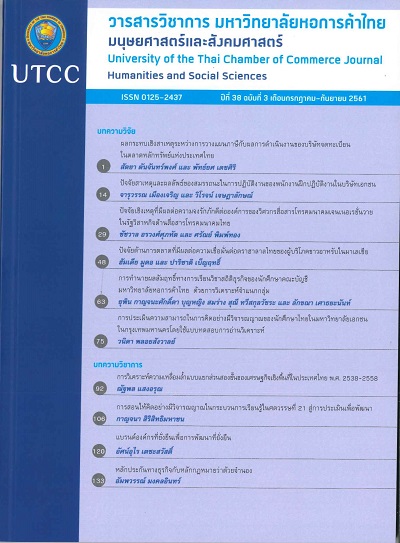Teaching Critical Thinking in the 21st Century Learning Process towards Assessments for Development
Main Article Content
Abstract
The purposes of this article were as follows: 1) To create an understanding on critical
thinking teaching in the learning process of the 21st century, 2) To create an understanding on
critical thinking teaching in assessments for development of the 21st century. In the past most
students were most likely receivers and did not possess critical thinking skills in many aspects.
Even though teaching and learning process has been encouraged as student-centered approach,
Thailand has still faced a problem of lacking critical thinking skills for student. For example,
Thai students lack creative thinking to develop their own innovation. Some people can create
innovation but cannot seek any methods to develop it for public use or to be acceptable in
international levels. Consequently, Thailand has to regularly rely on other countries’ innovation.
Critical thinking teaching plays a major role in the 21st century learning process and can be applied
to assessment for development. Then, understanding about the two processes is considered
a complete teaching process in the 21st century
Article Details
ลิขสิทธิ์ของบทความ
ผลงานที่ได้รับการตีพิมพ์ถือเป็นลิขสิทธิ์ของมหาวิทยาลัยหอการค้าไทย ห้ามมิให้นำเนื้อหา ทัศนะ หรือข้อคิดเห็นใด ๆ ของผลงานไปทำซ้ำ ดัดแปลง หรือเผยแพร่ ไม่ว่าทั้งหมดหรือบางส่วนโดยไม่ได้รับอนุญาตเป็นลายลักษณ์อักษรจากมหาวิทยาลัยหอการค้าไทยก่อน
References
Bellanca, J., & Brandt, R. (2013). 21st century skill: Rethinking how students learn (W. Wongkitrungrueng & A. Jittaruek, Trans.). Bangkok, Thailand: Openworlds. (in Thai).
Office of the Basic Education Commission, Upper Secondary Education Bureau. (2015). Ways tomanage professional competencies-based learning skills in 21st century. Bangkok, Thailand: Printing House of Agricultural Cooperative Federation of Thailand. (in Thai).
Office of the Education Council. (2014). Research report: Guidelines for development of Thai education for the 21st century. Bangkok, Thailand: Author. (in Thai).
Office of the Education Council. (2016). Research report for policy proposal for citizenship education development. Bangkok, Thailand: Author. (in Thai).
Pornkul, C. (2011). Teaching critical thinking: theory and application. Bangkok, Thailand: Chulalongkorn University Press. (in Thai).
Panich, V. (2013). How does learning process happen. Bangkok, Thailand: Siam Kammajol Foundation. (in Thai).
Panich, V. (2014). Assessment for delivering learning power. Bangkok, Thailand: San Aksorn. (in Thai).
Sattrapruek,S. (2017). Flipped classroom in 21st century learning for development of learning and innovation skills. Academic Services Journal, Prince of Songkla University, 28(1), 100-108. (in Thai).
Thanormchayathawat, B., Vanitsuppavong, P., Niemted,W., & Portjanatanti, N. (2016). 21st century skills: A challenge for student development. The Southern College Network Journal of Nursing and Public Health, 3(2), 208-222. (in Thai).


